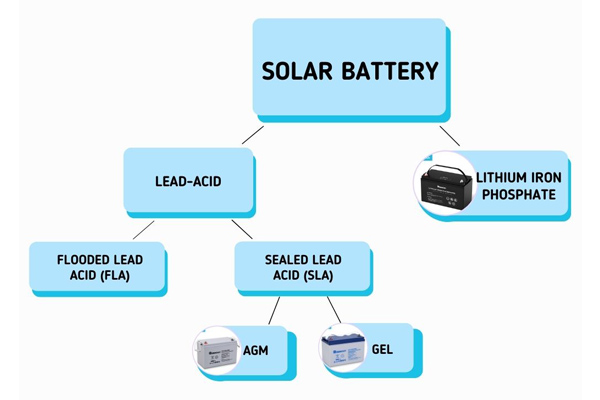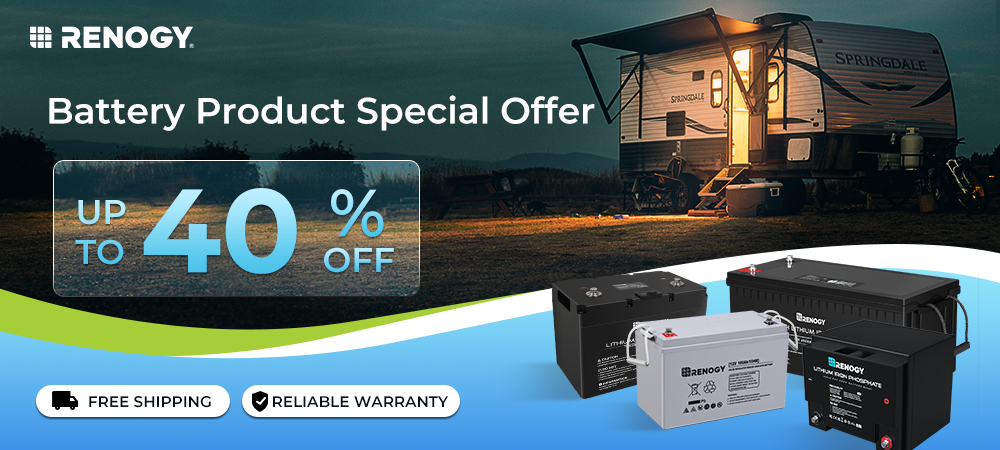Things about RV House Battery Replacement
If you're like most RVers, you like being able to flip a switch and have things happen inside your RV: the lights turn on, the water heater heats up, the water pump primes, you get the idea.
But, maybe you've noticed lately that it isn't keeping your lights as bright or running as long as it used to. You're having to plug back into shore power or run your generator more frequently.
Your RV house batteries might need to be replaced.
Whether you know it or not, you rely on your house batteries to provide power for most of the creature comforts of home while on the road. Replacing batteries on your RV, no matter what type of RV you have can feel daunting and overwhelming. It doesn't have to be. At Renogy, we're here to help clear up some of the confusion and fear about RV battery replacement.
In this guide, we'll walk you through the basics of what you need to know about replacing RV house batteries.
What is an RV house battery?
If you're reading this article and scratching your head because you have no idea what an "RV house battery" is, don't worry. This is the section for you.
If you have a motorhome (Class A, B, C, etc.) that has an engine, you'll likely have at least two batteries in your rig. The one (sometimes two, depending on the size of the motorhome) located in or near the engine compartment is what's referred to as a Starting Battery. They have the sole purpose of starting the engine and handling other vehicle-related functions.
The other set of batteries, frequently located in an exterior compartment or possibly under an interior seat, are the batteries we're referring to. These are the only batteries that non-motorized RVs usually have. They are often found in the two locations mentioned above as well as on the tongue of the trailer if it's a bumper-pull.
These batteries are the ones that actually power the things (ovens, TVs, etc.) inside the RV. More so if you have an inverter (something we won't cover in this article).
What type of batteries are RV house batteries?
If you need to determine what type of battery your RV battery is, check out the product label on the battery, the user manual, or inquire your RV dealer.

Flooded Lead Acid (FLA)/Wet-type
Lead Acid "wet" batteries are by far the most economical. They've also been around the longest and require the most maintenance. These are the batteries that require you to fill them with water when you first install them. They also have a fraction of the capacity and life cycle of more modern battery types.
Absorbent Glass Mat (AGM)
AGM is a fairly common battery type, one of the ones that we sell at Renogy. It is typically safer and easier than wet-style lead acid. It's often called a sealed battery since you don't have to add water to it to keep it working correctly. The gasses released from the effect of storing and releasing power are reconstituted back into the battery, leaving no off-gassing. These batteries also charge faster and are tougher than some of their counterparts.
To learn more about AGM batteries, please read What Is An AGM Battery?
Gel-type
Optimal for efficient energy storage, Gel batteries are the perfect choice if you need dependable power at a good price. Utilizing a thick gel-like substance in their cells, they're low maintenance and highly resistant to shock or vibration. They also can withstand wide temperature ranges and provide a better charge life than AGM batteries.
Find more related information in Solar Gel Batteries: Everything You Need To Know.
Lithium Iron Phosphate
Lithium batteries are a cut above other battery options in nearly every way, offering higher charge density, longer durability, and the ability to deep cycle while maintaining power. Renogy even offers them built-in Bluetooth monitoring so you can keep an eye on charge level, battery temperature, discharge, etc., as well as self-heating functions which allows the battery to sustain longer at freezing temperatures, for example, the 12V 100Ah Smart Lithium Iron Phosphate Battery w/ Self-Heating Function.
Renogy's supply of lithium iron phosphate batteries in 12-volt, 24-volt, and 48-volt configurations are proven as the safest ionic lithium option on the market. Their maintenance-free design yields an ultra-long life span making them a better investment in the long run.
How often do RV house batteries need to be replaced?
Every battery type has a different life expectancy. Within those differences, there are many other factors that can affect the life of deep-cycle RV house batteries, such as:
● How you plan on using the battery - i.e., do you drain it down before recharging it?
● How you store your RV - i.e., is it temperature regulated, do you unhook the battery, do you leave a trickle charger on it?
● How often you use your RV.
The frequency of use and proper maintenance plays an integral role in extending the life span. For example, lithium-ion batteries can easily last five years while being used at a 100% discharge and over 2000 charge cycles. An AGM battery shouldn't ever be drained below 50% discharge and will be less likely to hit the five-year mark without a significant drop in battery capacity.
Therefore, the frequency for replacing RV house batteries depends upon the lifespan of the battery type and how you use a battery.
If you have an RV house batteries, this guide of How To Store Lithium Batteries & Care Of Lithium Batteries is perfect for you.
Can I replace my RV house battery with a lithium battery?
In short, yes! Upgrading your battery bank to lithium-ion can be one of the easiest and best updates you can make to your RV. Especially if your rig has high-maintenance wet batteries.
Our award-winning lithium iron phosphate batteries are half the weight of traditional lead acid batteries. They have a much higher capacity for the same space requirements. They're tough, and they can be discharged much farther than traditional batteries. Plus, as we mentioned before, we offer them Bluetooth capabilities so you can fully monitor them at your fingertips.
We stand behind our batteries
At renogy, we are focused on not only packing our batteries with the latest and best technology but also some of the best warranties in the class. We have all major types of 12 Volt batteries, 48V batteries, and can help you pick out the right ones for you. In addition, we have great sales available. Check it out right now.
Related articles:
Best Battery For Trolling Motor
RV Battery Size Chart | Renogy Battery Buying Guide
How to Store Lithium Batteries & Other Battery Maintenance Tips








